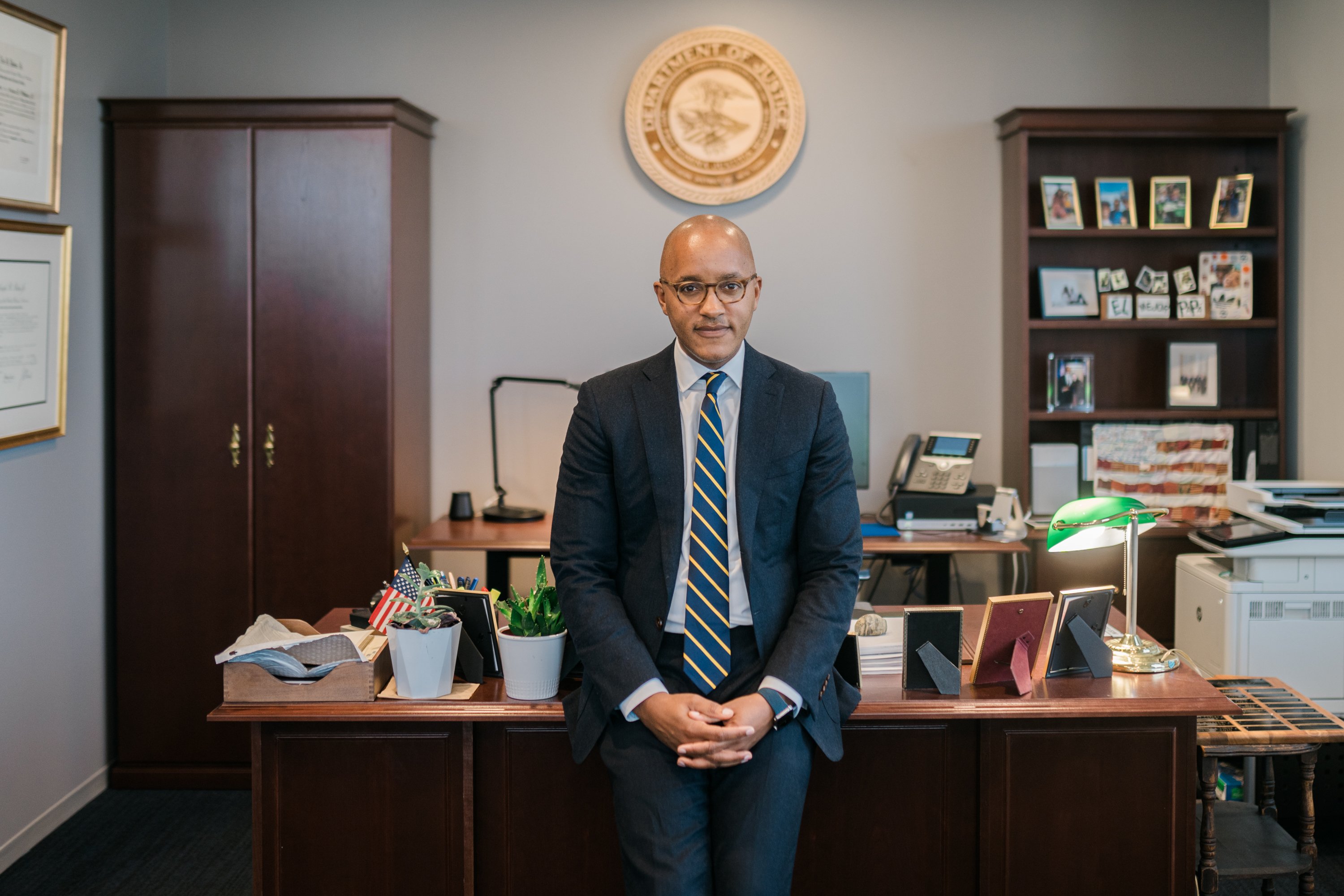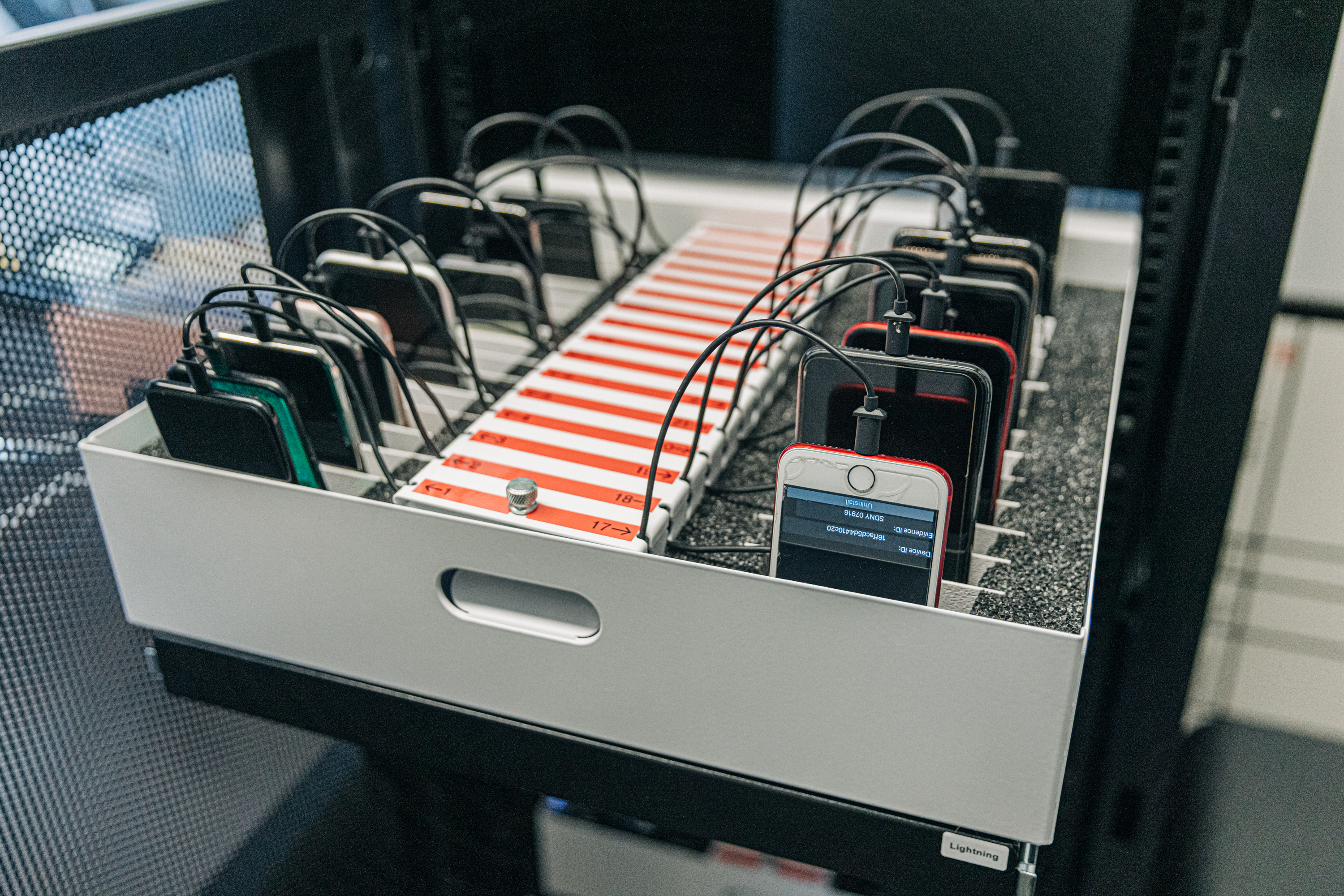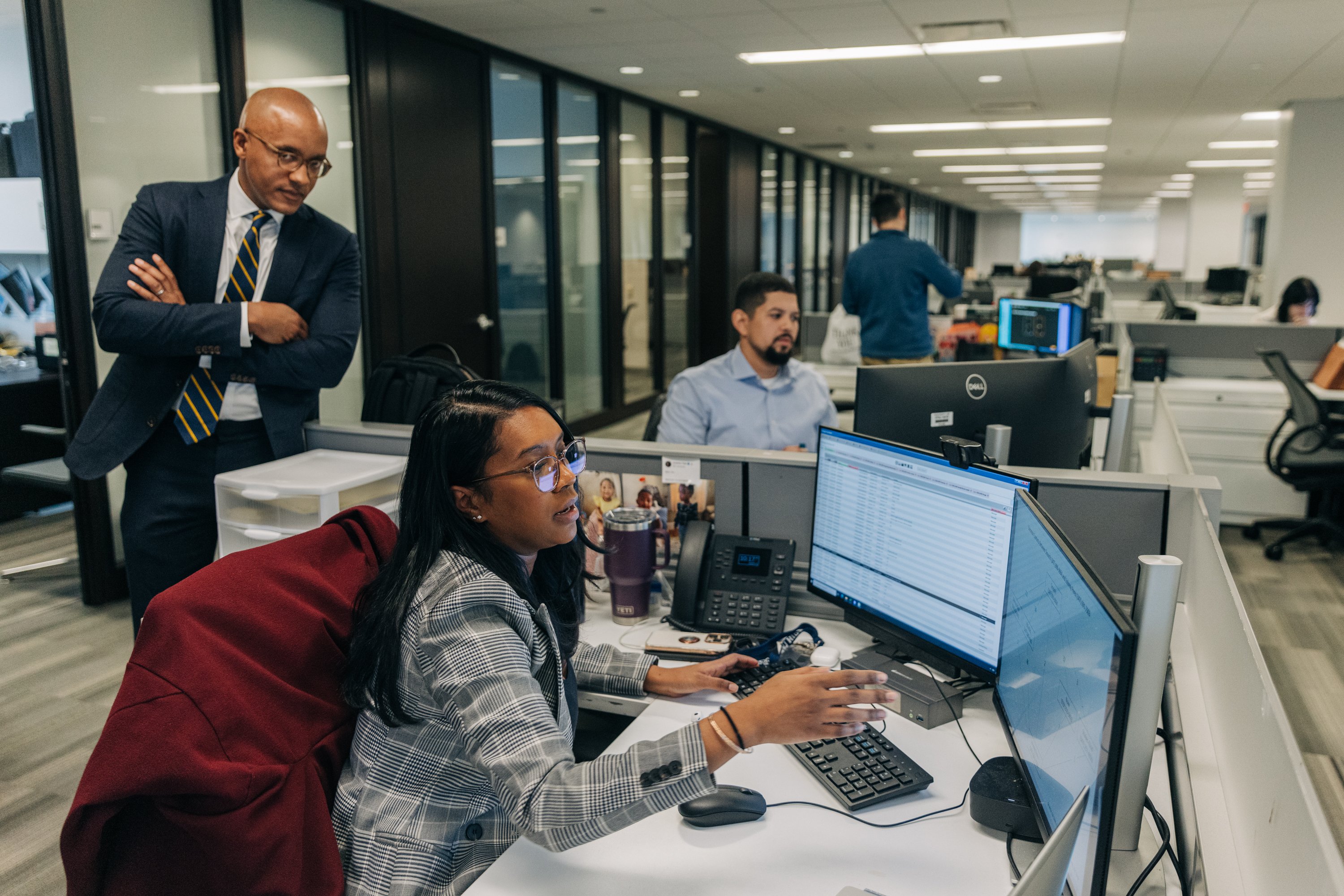In New York, top federal prosecutor Damian Williams preaches speedy justice

Manhattan U.S. Attorney Damian Williams has made a name for himself in law enforcement circles for modernizing how prosecutors get, analyze and use data. Jeenah Moon for The Washington Post
In a black metal-and-glass cabinet in a Lower Manhattan office building, dozens of cellphones sit in racks while encryption-cracking software silently spins through thousands of combinations to guess their passwords.
It can take an hour, a month or even a year to open a phone. When a screen turns green, a federal investigator opens the cabinet, slides out the shelf and plucks out the newly cracked device like it is fresh-baked bread.
To U.S. Attorney Damian Williams, this isn’t the future of law enforcement. It’s very much the present.
The phone-cracking and analysis work is part of an initiative he launched to fast-track the evidence extraction his office cares most about. Until recently, outside investigative agencies would work to unlock seized phones, sending word to federal prosecutors when a device was accessed. Now Williams has a team of more than a dozen technical experts doing the work. They decide what needs the most urgent attention—whether it’s a fentanyl poisoning, public corruption or a securities fraud case.
Williams, a high-profile prosecutor in the biggest U.S. city, says he would like to see this approach replicated across the country. Federal criminal cases are built on data, and Williams has made a name for himself in law enforcement circles as wanting to modernize how prosecutors get, analyze and use that data.
“You name it, I want us to be the tip of the spear,” Williams said in an interview with The Washington Post. “If there’s a case where you can sprint, our view is that you should sprint. If there’s a case where you have to go more slowly, then you should go more slowly, but you have to be able to do both.”
In late 2021, Williams became the first Black person to lead the Southern District of New York U.S. attorney’s office—often referred to unaffectionately as the “Sovereign District” for its habit of acting independently of Justice Department headquarters. During the Trump administration, the office ran afoul of then-Attorney General William P. Barr, who forced out then-U.S. Attorney Geoffrey Berman after disagreements about investigations.
In his two-plus years on the job, Williams has become known as a quieter, less confrontational New York prosecutor than some of his predecessors, but in some ways even more influential, in part because of his connection to Attorney General Merrick Garland, for whom he served as a law clerk when Garland was a federal judge.
Some federal law enforcement officials who have worked with him privately expressed concern that Williams, 43, is too young and too unfamiliar with Washington to take a high-level Justice Department job if President Biden wins a second term. But others describe him as a shrewd listener and decision-maker, and his successes, in court and in closed-door government settings, have some influential Democrats already thinking of him as a future senior official.
“I think he’s done a stellar job and it wouldn’t surprise me if at some point he ends up in Washington,” said Eric H. Holder Jr., the first Black person to become attorney general. “He’s an interesting mix in that he’s preserved a lot of the Southern District’s traditions—hard-charging, creative, independent—but I think he’s also working hard to be a leader in the broader Justice Department community.”
 Phones in the “oven,” where encryption-cracking software silently spins through thousands of combinations to guess their passwords. Jeenah Moon for The Washington Post
Phones in the “oven,” where encryption-cracking software silently spins through thousands of combinations to guess their passwords. Jeenah Moon for The Washington Post
Vanita Gupta, who until recently served as the No. 3 official at the Justice Department, praised Williams’s work coordinating with other federal prosecutors around the country.
Under Williams, the U.S. attorney’s office “continues to do groundbreaking work, but not on an island - it’s stitched in with the ethos and practices and communications and relationships in the department,” she said. “His leadership style and role as chair of the attorney general’s advisory committee keeps him connected to the whole department.”
Williams, who graduated from Harvard College and Yale Law School, is not well known in the nation’s capital, and that could limit his range of opportunities there, especially when it comes to a job like attorney general.
At a time when Biden and some of his advisers have been frustrated by Justice Department decisions on politically sensitive cases—like the tax and gun charges against the president’s son Hunter Biden—being seen as Garland’s protégé could be a double-edged sword.
When asked if he has any ambition to become attorney general or another senior-level position in Washington, Williams demurred.
“This,” he said, sitting in his office overlooking Manhattan, “is a dream job.”
He traces his investigative impatience back to his own experience as a line prosecutor in the office he now runs—waiting on evidence to come back from communications companies, banks or devices, then receiving that evidence in the form of hard-to-follow spreadsheets that he struggled to understand. As U.S. attorney, Williams has embraced a different approach, one that does more of the data retrieval and sorting in-house. When the chance came to hire more prosecutors, he decided instead to hire more data experts.
He said he wants to be known internally as the U.S. attorney who modernized and streamlined the behind-the-scenes work that makes the office run better, faster and farther.
“If I’m doing an insider-trading case, the smoking gun is literally buried in a spreadsheet,” Williams said. “If I roll this massive spreadsheet in front of a jury, it will not speak to them, so how do I make this come alive? A lot of what we’re doing is being nimble and creative.”
 An investigative analyst works at her desk in New York last month as Damian Williams observes. Jeenah Moon for The Washington Post
An investigative analyst works at her desk in New York last month as Damian Williams observes. Jeenah Moon for The Washington Post
When FTX, the world’s third-largest cryptocurrency exchange, collapsed in late 2022, Williams’s office led an international investigation that resulted in the arrest of founder and CEO Sam Bankman-Fried a little more than a month later—unusually fast compared to many global financial fraud investigations.
“We wanted to show the world just how quickly SDNY could actually go, and I think the expectations were probably that it would take years to investigate a fraud of that magnitude, and we were able to bring charges within weeks,” Williams said. “We think that enhances credibility in the department and in the justice system generally because it shows that we can be just as aggressive in investigating and prosecuting white-collar crime as we are investigating quote-unquote blue-collar crime. We’re very proud of that.”
Cryptocurrency markets are something of a Wild West environment, rife with hype artists, snake-oil salesmen and outright fraud. The federal government seizes so much crypto in fraud investigations that it has to sell off those seizures in pieces, in order not to dump so much digital currency onto the market at one time that valuations would tank.
Last year alone, Williams’s office seized more than $2.2 billion in various assets. He conceded he could deploy his entire workforce to do nothing but crypto fraud, but said that would be foolish. Instead, his investigators and prosecutors pursue “the cases where we think we can have a big impact.”
By tradition and geography, Williams’s office is always running a host of high-profile cases, and controversy comes with the territory. Former president Donald Trump’s lawyers have accused the U.S. attorney’s office of scheming with the Manhattan district attorney’s office to withhold more than 100,000 pages of potential evidence until just before the scheduled start date for Trump’s trial on charges of breaking state laws about business records when he secretly paid off an adult-film star in 2016 to keep her from alleging a tryst years earlier.
Trump’s legal team accused prosecutors of unfairly withholding key documents, including records of FBI interviews with Trump’s former attorney and fixer Michael Cohen. The district attorney denied any impropriety, saying that everyone acted in good faith and that the two prosecutor’s offices ran completely separate investigations of some of the same conduct.
New York Supreme Court Justice Juan Merchan ruled last month in the prosecutors’ favor, and the case is due to go to trial next week. The judge never called Williams or one of his staff members to ask about their conduct in the case, ruling that the defense claims of misconduct by the district attorney were baseless.
In the past month, Williams’s office won a conviction of a former president of Honduras, pursued searches of hip-hop mogul Sean “Diddy” Combs’s homes in a human-trafficking investigation and won pretrial rulings in its indictment of Sen. Bob Menendez (D-N.J.), the former chairman of the Senate Foreign Relations Committee.
The Menendez case marked one of the few moments of friction between Williams and Justice Department headquarters, according to people familiar with the matter, who spoke on the condition of anonymity to discuss internal conversations.
When it came time to announce the indictment, Justice Department officials wanted to follow their long-standing practice for sitting members of Congress and issue a written statement rather than hold a news conference. Williams disagreed, based on the past practice of his office. He and some FBI officials appeared briefly before reporters to announce the case, which accused Menendez of stashing gold bars in his house that he had received from a favor-seeking businessman.
Williams is also investigating New York Mayor Eric Adams (D) over allegations that officials in Turkey may have steered campaign contributions to the mayor in exchange for official favors. Adams has not been charged with a crime and denies wrongdoing.
In both cases, investigators have pursued allegations of local corruption with allegedly foreign roots. Williams said more and more of his office’s corruption probes seem to trace back to countries and actors outside the United States.
“We have seen an increasing nexus with international players, components, etc., in some of our corruption investigations,” he said.
“That is not necessarily the headline from our perspective - it just means that we have to have the appropriate capacity to deal with it. So for instance in certain cases, you may have an international component where there will be some classified holdings. … It’s a challenge, but it’s not one that shocks us. We just pivot.”
And always there is the desire for speed.
Law enforcement officials say the phone-cracking work is particularly important in fighting the epidemic of fentanyl poisoning, because dealers may quickly start destroying evidence if they know they’ve caused deaths.
In September, one such case made national headlines—a 1-year-old boy at a Bronx day care died from exposure to the powerful drug. Investigators quickly determined that the day care was secretly also home to a drug operation, but the key figure in the operation had vanished.
Williams’s digital forensic unit was deployed to examine the multiple phones recovered by the Drug Enforcement Administration. One of the phones was cracked in the “oven” in about an hour, allowing the data analysts to dig in.
According to public statements issued by Williams’s office, the fleeing suspect had deleted roughly 21,526 encrypted messages, but investigators were able to recover much of the communications and then track him down to Mexico, where he was arrested.
Williams said it’s the quick work that the public doesn’t get to see that is often the difference between success and failure.
“The outcomes get covered, the indictments get covered, the trials get covered, but how we actually get to the place where we’re able to do things quickly and effectively, that doesn’t really get discussed,” he said.



